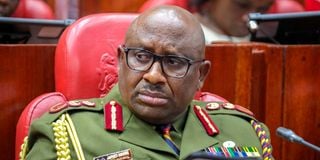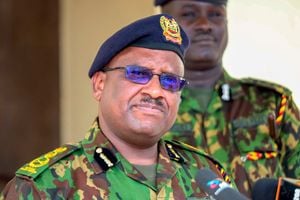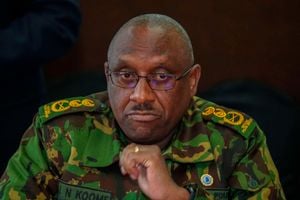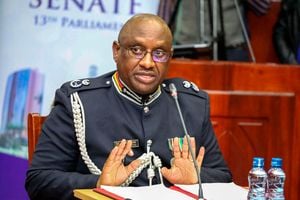
Former Inspector-General of Police Japhet Koome.
Resigning just two days after coming under harsh criticism from senators from both sides of the aisle, Inspector-General of Police Japhet Koome would appear to have been thrown under the bus as questions linger over police killings of Gen Z anti-tax protesters.
President William Ruto announced Koome’s replacement on Friday shortly after opposition leader Raila Odinga’s ODM party set his sacking as a key condition for participation in the multi-sectoral talks called to discuss the issues raised by the youth revolt.
Although it is not clear if it is the ODM demands that prompted the President to push Koome out, the I-G has been under scrutiny over heavy-handed police action on protesters, including the use of live bullets on unarmed youth.
Questions still linger, also, over abductions, torture, and possible forced disappearances by masked plainclothes policemen targeting suspected leaders of the Gen Z revolt. Some of those abducted were singled out merely for sharing protest posters on social media, even if not directly involved in the organisation and planning.
Questions were also raised on how the police failed to defend Parliament Buildings on the climactic day when protesters breached the security cordon and invaded the hallowed precincts, setting ablaze a section of the buildings, destroying furnishings and equipment and even entering the debating chambers. President Ruto was forced to turn to the Kenya Defence Forces to patrol Nairobi streets, attracting criticism for deploying the military to combat civilian protesters. The action was also a show of no-confidence in the police.
Two days before Koome resigned, he came under sustained attack during debate in the Senate, where members from both sides of the House united in questioning his competency, use of excessive force and loud silence throughout the duration of the protests. From the government benches, Majority Leader Aaron Cheruiyot, who usually echoes the official line, noted Koome’s lack of situation updates during critical moments.
Provide leadership
“I am yet to hear the voice of the Inspector-General, I am deeply troubled by that, it cannot be right,” he said. He was backed by Nandi Senator Samson Cherargei, who asked for “A proper reshuffle on the security of this country … the Inspector-General must be called out for failing to provide leadership”. Kitui Senator Enoch Wambua, from the opposition side, demanded that Koome “leave office immediately for this country to enjoy peace and tranquility”. Wambua said. Taking the same position was Kakamega Senator Boni Khalwale, Kenya Kwanza, who asked the president to “quickly restructure the security organs by firing people”.
Appointed in October 2022 soon after Ruto took office, succeeding Hilary Mutyambai who opted out citing ill-health, Koome was a career policeman who, however, distinguished himself from other senior officers with his degree in engineering. Unlike the two previous police chiefs, Joseph Boinett, (2015 to 2019) and Mutyambai (2019 to 2022) who had been drawn from the National Intelligence Service as part of efforts to reform the National Police Service, Koome had risen through the ranks.
Seen as a strict, no-nonsense law and order disciplinarian, he made it clear from the word go that he had no time for citizen protests, making him the ideal police boss for Ruto who early his term was facing increasingly violent demonstrations called by his losing presidential election rival, Raila. Videos emerged of Koome, during a previous assignment as Nairobi police commander, personally throwing rocks at Raila’s car as he tried to quell previous protests in the capital city.
During the Raila-led protest that shut down parts of the capital city in the early part of 2023, Koome was prominent, issuing stern warnings against the opposition, rubbishing pleas that marches and picketing were guaranteed constitutional rights. He routinely rejected opposition applications to hold demonstrations or meetings, insisting that any gatherings staged without his express authority would meet the full force of the law. While many of the demonstrations called by Raila did turn violent, necessitating use of force to disperse the mobs, it was also apparent in many instances, it was police use of force against peaceful gatherings that provoked violence.
Police accountability
During his tenure, Koome also came under scrutiny for resisting police accountability mechanisms. Soon after appointment he issued ‘shoot to kill’ orders against suspected criminals, and instructed his officers to ignore any queries of summonses from the statutory Independent Policing Oversight Authority. He also made sure the police Internal Affairs Unit came tightly under his thumb, making it almost impossible for the body charged with in-house investigations into police misdeeds to performs its functions.
Koome also openly clashed with the Police Service Commission, abrogating to himself, with apparent support from then-Interior Cabinet Secretary Kithure Kindiki, the power to hire, fire, promote and transfer officers. It is still unclear whether Koome’s exit has to do with questions over police excesses while quelling the protests, or failing to employ more aggressive methods so that the Gen Z movement didn’t take on a life of its own.
It is notable, however, that Ruto has been extremely reluctant to censure the police over the killings of peaceful demonstrators. At almost every opportunity, he has actually praised the police for what he insists has been excellent work in the face of extreme provocation. He has also continued to insist that fatalities affected violent criminals who had hijacked the demonstrations, thereby justifying police use of deadly force.
To be fair to Koome, however, some of the police excesses which continue to attract scrutiny appeared to be out of his hands. The masked plainclothes officers in unmarked cars with fake number plates who carried out the spate of abductions appear to be from a special squad set up by the Directorate of Criminal Investigations under Mohammed Amin and the National Intelligence Service headed by Noordin Haji.
According to some of those who survived the abductions and have been brave enough to recount their ordeals (many remain too traumatised to speak even to human rights defenders and lawyers), their interrogators were looking for evidence linking the protests to funding from Deputy President Rigathi Gachagua and former President Uhuru Kenyatta, or some foreign NGOs. Amin was appointed as soon as Ruto took office in September 2022 and forced out the disgraced George Kinoti, who had turned the DCI into a political tool for President Kenyatta and redoubt for extra-judicial executions.
Ruto took office pledging a halt to weaponisation of the criminal justice system for political purposes. He also promised an end to the culture of police killings. However, it is becoming clear, especially with police responses to political protests that the same old habits never went away under Koome at police headquarters and Amin at DCI.
It remains to be seen whether Koome’s successor (Assistant I-G Douglas Kanja is currently acting while a substantive A-G is sought and formally submitted for vetting by Parliament) will come with a clear brief to clean the police service of elements accustomed to criminal excesses, and rein in rogue DCI operations.











